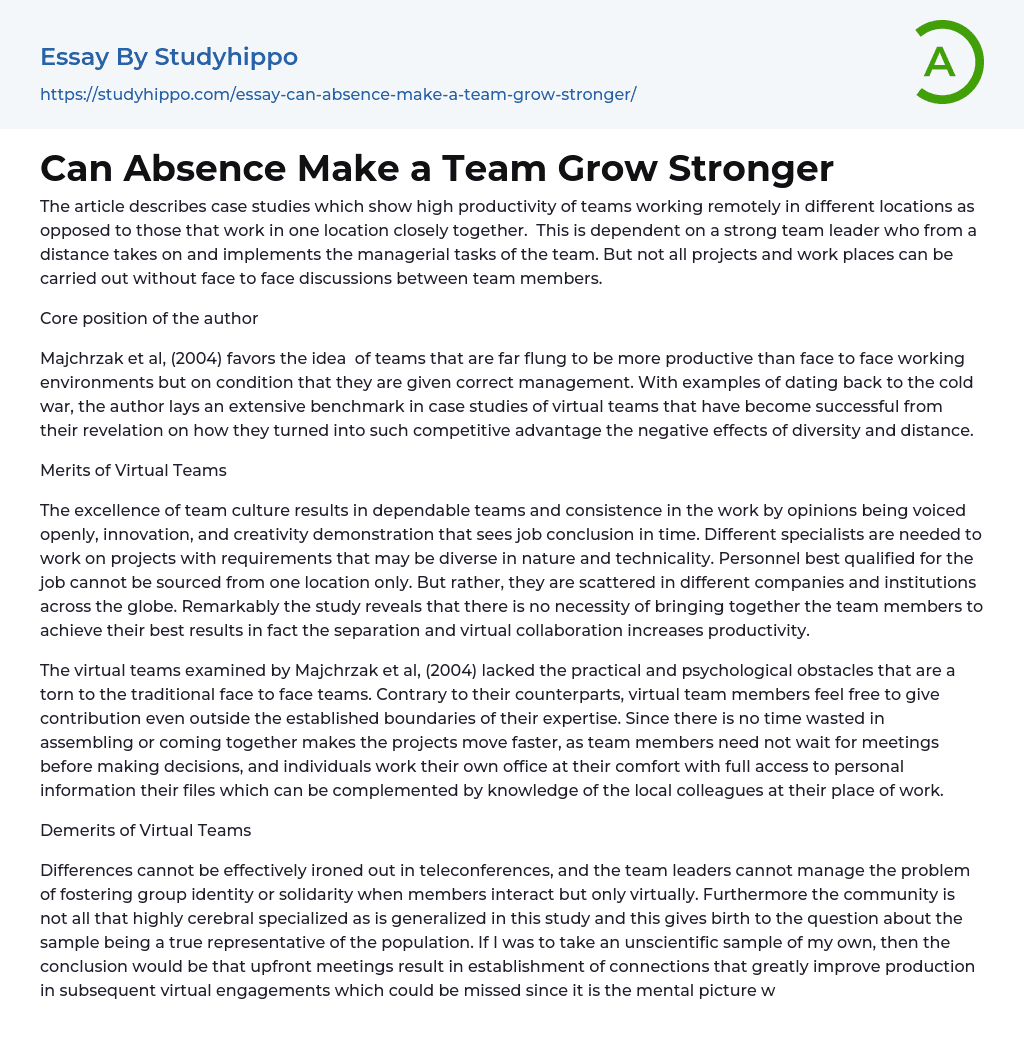Comparing remote teams to co-located teams emphasizes their success. For remote teams to thrive, it is crucial to have a skilled team leader who can manage the team effectively from a distance. Nonetheless, it is important to acknowledge that certain projects and work environments may still necessitate face-to-face communication among team members.
Core position of the author
Majchrzak et al. (2004) argue that remote teams can be more productive than face-to-face teams if they are well-managed. The author presents several case studies, including historical examples from the cold war era, to illustrate how virtual teams have effectively turned diversity and distance into a competitive edge.
Merits of Virtual Teams
The effectiveness of team culture leads to reliable teams and consistency in work by encouraging o
...pen expression of opinions, showcasing innovation and creativity, and ensuring timely completion of tasks. Projects often require specialists with diverse skills and technical expertise, who may be located in various companies and institutions worldwide. Surprisingly, research shows that physically bringing team members together is not necessary to achieve optimal results; in fact, separating them and facilitating virtual collaboration can enhance productivity.
According to Majchrzak et al, (2004), the virtual teams they studied did not face the practical and psychological obstacles that traditional face to face teams encounter. Unlike face to face teams, virtual team members are more inclined to contribute beyond the boundaries of their expertise. This is because there is no need for them to waste time assembling or meeting in person, which allows projects to progress faster. Additionally, virtual team members have the flexibility to work from their own offices
accessing personal information and files while being able to collaborate with colleagues from different locations.
Demerits of Virtual Teams
Teleconferences are not effective in resolving differences or fostering group identity and solidarity among team members who only interact virtually. Additionally, the community being studied in this research is not as highly specialized as previously assumed, raising questions about the sample's representativeness. If I were to conduct my own informal survey, I would conclude that in-person meetings establish connections that significantly enhance productivity in subsequent virtual engagements. These benefits may be overlooked because our mental perception plays a crucial role in determining our successes or failures (Hause, 2003).
The global community encompasses various traditions and cultural disparities that significantly shape our workplaces and lifestyles. Neglecting these differences can have a detrimental effect on our work environments. For example, in Nordic countries with high internet and mobile phone usage, remote work is often preferred over in-person interaction. Conversely, many African cultures prioritize personal connections and physical engagement rather than virtual communication. The primary focus of the diverse technologies mentioned in the article is to assist virtual teams rather than traditional ones.
Major Implications for application to organizations
To fully benefit from the mentioned advantages, effective management of social dynamics and work procedures is necessary for virtual teams. This can be achieved by relying on videoconferencing and email as the main communication methods. However, there are additional costs associated with virtual teams to ensure success. These include using advanced online discussion rooms, monitoring work progress, and reminding team members of decisions and commitments made. These measures aim to replicate face-to-face interactions
in traditional work environments.
Furthermore, it is important to conduct preliminary research to assess how well the team can adapt to virtual engagements without negatively affecting efficiency and productivity. It's crucial to recognize that some projects may still require face-to-face interaction in academic settings when practical components are involved for a comprehensive understanding of concepts. Therefore, not all projects are suitable for remote work arrangements (Kerr, 2004).
Conclusion
In today's global arena, teamwork is crucial for competition. Instead of striving for personal perfection, a high level of teamwork or collective performance is desired. It is now more important than ever for teams to work and function effectively with minimal supervision. In a team culture, individual members actively participate and showcase their abilities and talent to achieve common goals as a unit.
- Email essays
- Hypertext Transfer Protocol essays
- Marshall Mcluhan essays
- Virtual Learning Environment essays
- Web Search essays
- Etiquette essays
- Mainstream essays
- Vodafone essays
- Web Search Engine essays
- Android essays
- Application Software essays
- Benchmark essays
- Computer Network essays
- Computer Programming essays
- Computer Security essays
- Computer Software essays
- Cryptography essays
- Data collection essays
- Data Mining essays
- Graphic Design essays
- Information Systems essays
- Internet essays
- Network Security essays
- Website essays
- World Wide Web essays
- Abnormal Psychology essays
- Abraham Maslow essays
- Attachment Theory essays
- Authority essays
- Behaviorism essays
- Classical Conditioning essays
- Cognitive Psychology essays
- Counseling essays
- Developmental Psychology essays
- Educational Psychology essays
- Erik Erikson essays
- Family Therapy essays
- Jean Piaget essays
- Maslow's Hierarchy Of Needs essays
- Mental Health essays
- Operant Conditioning essays
- Personality Psychology essays
- Positive Psychology essays
- Psychoanalysis essays
- Psychotherapy essays
- Sigmund Freud essays
- Social Psychology essays
- Stanford Prison Experiment essays
- Supersize Me essays
- Administration essays




